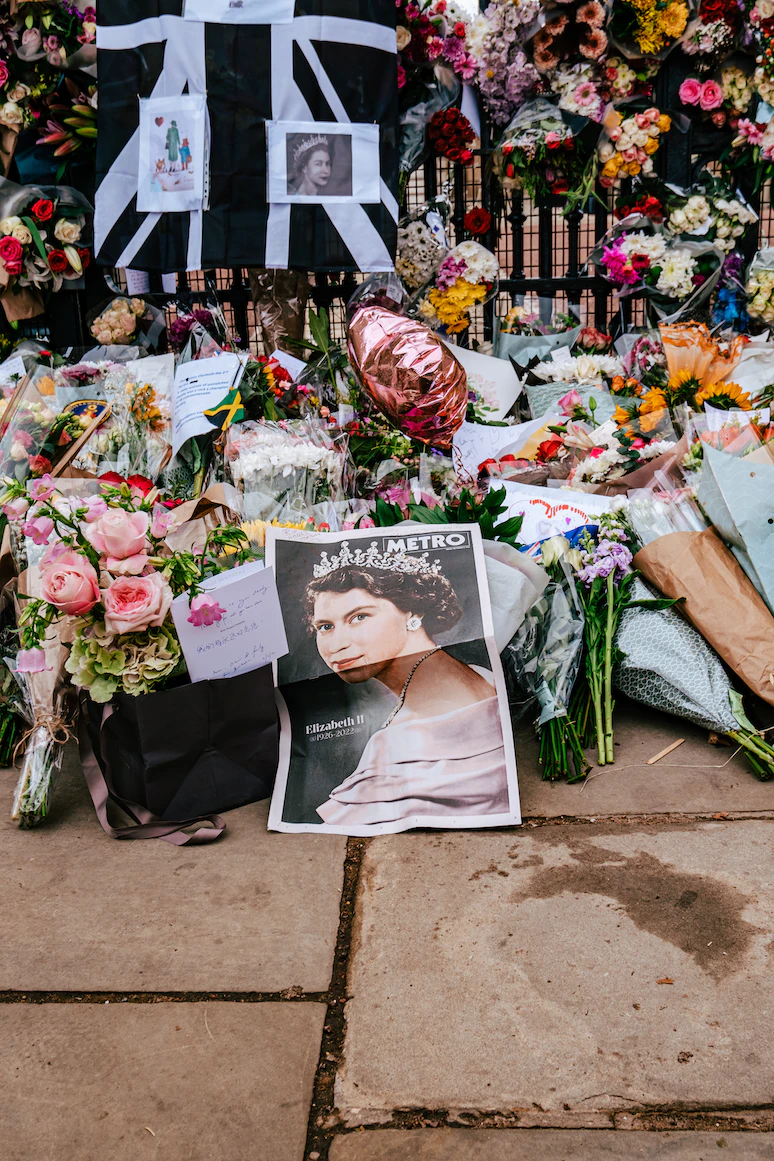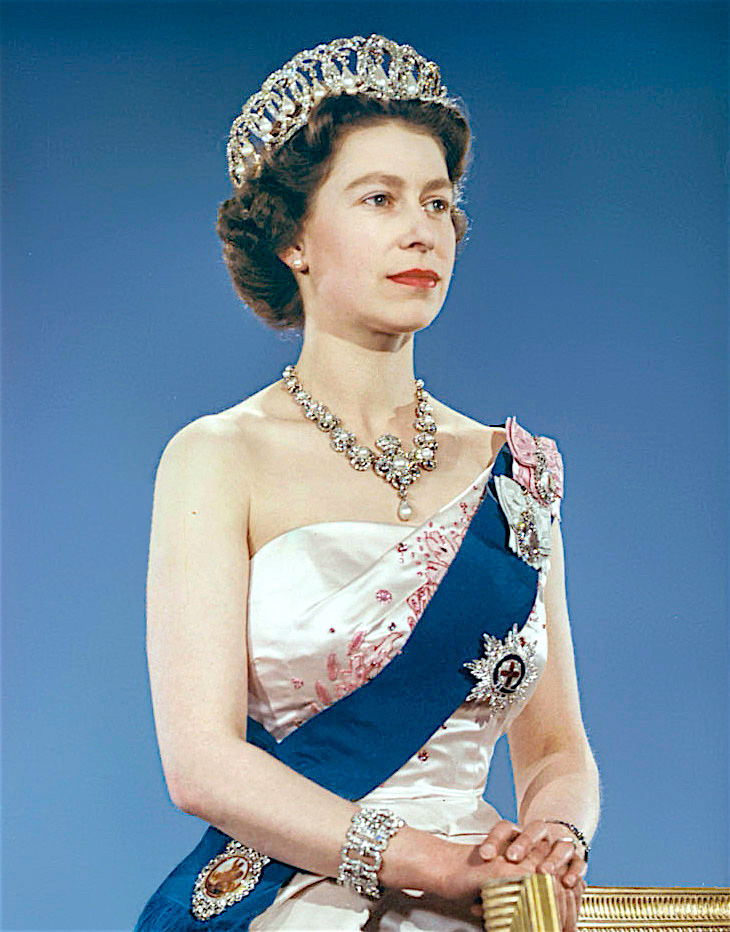The Queen's (and the Monarchy's) Legacy

In the fading winter of 1952, news of King George VI's death made Elizabeth Alexandra Mary Windsor's ascension to the throne inevitable. As a young woman, still just a girl at the tender age of 25, neither Elizabeth nor her people could have ever imagined she might one day become the longest reigning monarch in British history, presiding over decades of swift change. Elizabeth's coronation came soon after the end of the Second World War, providing a sense of stability to the British people at a time when the nation was in shambles. The nature of her royal lineage, dating back to 1066, imbued a sense of legitimacy in the young Queen's rule.
"The Queen is an incarnation of traditional values, which for many Brits is what keeps the kingdom united and running," says Professor Ziad Majed, the Elliott E. Burdette Professor of Middle Eastern Studies at AUP. In the next 70 years that would follow, Queen Elizabeth II would serve as a personification of the very spirit of the United Kingdom, acting as a figurehead of stability and continuity; the divinely-anointed link between the former glory of the British Empire and the change brought about by rapid modernization in the second half of the 20th century.
From the Cold War to the 2019 Coronavirus Outbreak, Queen Elizabeth II has witnessed some of the most significant markers of contemporary history, acting as a quiet bystander to events that have shaped the modern world for better or worse. "For most of the population, she's the only monarch in our living memory," said Elsa Darlington, a British masters student at AUP, pointing to the Queen's significant cultural impact.

Source: Library and Archives Canada, 1959. Formal Portrait of Queen Elizabeth II.
Cait Brown, a British sophomore at AUP, said "She has been all we have known for so many years that she just seems like the icon of England. It's difficult to imagine the country without her... I think more specifically for the British people she has been a constant in the lives of my generation, my parents, and grandparents. No one alive in Britain has not been under her reign for the majority of their lives so she will always seem like home to us."
The monarch, who passed quietly in the early afternoon of September 8, 2022, has raised questions surrounding the British monarchy's future and critiques of the institution's murky past. As the aftershocks of the news gradually diminish over the next few days, it is important to consider the legacy being mourned. Once upon a time, in a not-too-distant past, the United Kingdom was known as 'the empire on which the sun never sets,' alluding not so subtly to the vast expanse of overseas British colonies that were plundered for Britain's socio-economic gain. As many of these former colonies celebrate decades of hard-earned independence, it becomes easier to forget the UK's imperialistic past. The Queen's death prompts us to reconsider the monarchy's moral values, the very foundations of which are built on exploitation. In a modern world context, can one venerate a monarch after acknowledging the horrors of their past?
For many of Britain's former colonies, independence came well after Elizabeth's coronation. In most cases, it wasn't independence graciously granted but instead fought for with blood. Through Kenya's Mau Mau Uprising, from 1952 to 1960, Egypt's Suez Canal Crisis in 1956, Yemen in 1963, and Ireland— much closer to home —to the early 2000s — Queen Elizabeth's early reign was defined by decolonization. More often than not, the United Kingdom expended considerable time, resources, and effort in an attempt to retain colonial power.

Source: Unknown. Queen Elizabeth in Aden Colony, 1954.
Jamaica and Barbados, former British colonies in the Caribbean, have now formally requested the British government for reparations several times over the decades. During Prince William and Princess Kate's visit to Jamaica as part of their 2022 Caribbean Tour, the royals' presence was essentially rejected by significant Jamaican scholars, politicians, and activists. Over 100 of these leaders signed a letter demanding reparatory justice for the UK's colonial aggression and participation in the slave trade— demands which have gone entirely unanswered.
Separating the monarchy's cultural importance from their colonial aggression is challenging for people from former British colonies. These nations and their citizens have significant generational trauma, which affects the countries' socio-political setups well into the present day. Leen Al-Daqqaq, a Moroccan and Palestinian sophomore at AUP described this aversion to the monarchy, saying that "The Queen’s name to me just reminds me of years of systematic violence on innocent communities. Her death doesn’t mean anything to me in the sense that reparations haven’t been made whether she was alive or not"
"The British empire was the most influential superpower in the world and played a major role in shaping our modern-day politics, hence why people will always be fascinated by it," said Al-Daqqaq. "However, there are a lot of communities that don’t share that same fondness or fascination of the Royal Family as much as the Westerners do since they were negatively impacted by the UK’s brutal colonial history and no one can blame them for feeling that way."
Professor Ziad Majed echoed the sentiment. "She was still Queen in moments where Britain was an aggressive colonial power, imposing their hegemony and illegally accumulating wealth. It is difficult for people who were in touch with that side of history to forget what the royal family stands for."
India, Pakistan, and many of Britain's former African colonies have demanded the return of important gemstones, historical artifacts, and precious metals that are at present stored in the British Museum or in state treasuries, demands which the Queen's death has renewed. Riches like the Kohinoor, one of the largest cut diamonds in the world (105 carats) valued at well over $400+ million, were looted from their origin countries by imperial Britain. The Kohinoor gemstone was previously the centerpiece of the Queen's crown— quite literally the proverbial crown jewel —and will be allegedly passed down to Camilla, Queen Consort to King Charles III. The diamond has been claimed by the governments of India, Pakistan, Afghanistan, and Iran, who have repeatedly demanded its return.
The tremendous wealth and luxury the Royal Family has accumulated through centuries of colonial expansion has created a carefully crafted image of opulence and superiority. The grandeur and age-old customs that are part of the Windsors' lifestyle are hardly relatable to the general public— a quality which only increases intrigue and fascination towards the Royals.
"There seems to be a desire to cling to the mythical idea of royalty, and in recent years the Windsors have become increasingly celebrity, even soap-opera-esque, which I suppose fosters a natural curiosity and attachment," said Darlington, referring to the production of shows such as Downtown Abbey, The Crown and Bridgerton that further perpetuate this picture-perfect image of British royalty and aristocracy.
The Queen's state funeral at Westminster Abbey took place on September 19, after a 10-day government-issued mourning period. No expenses were spared at the event, and the government was estimated to have spent millions of taxpayer pounds on security personnel, transport, and decor. This spending comes at a critical financial moment for the United Kingdom whose currency, the pound sterling, has been rapidly depreciating. Brexit and the Russo-Ukrainian War have created economic uncertainty, a cost-of-living crisis, and inflation in the UK, where living costs and utilities are expected to be at an all-time high this winter.
Queen Elizabeth's legacy is complicated. There is no denying that her reign has played a massive role in shaping British culture over the decades, helping the nation establish its position on the modern world stage. She was perhaps one of the most globally recognized Heads of State. But her wide celebrity also comes from years of her image gracing banknotes in foreign countries, former colonies which have now denounced her as their Queen.
"The Monarchy is intertwined with our [Britain's] very complex and violent colonial history, and I don't believe it's right, or possible, to celebrate one without an acknowledgment of the other," says Darlington, recognizing this complicated dichotomy.
Finding a balance between respecting a long-reigning monarch and holding that same institution accountable for the imperialistic ideas they represent is difficult, to say the least. Perhaps it begins with lowering the pedestal and remembering that the British monarchy, as it exists today ceremonially with little political power but tremendous wealth and prestige, only serves itself.
As Britain steps into a new era, newer traditions will arise. Already, the popularity of the monarchy is at an all-time low. With the benefit of historical hindsight, Britain must now acknowledge both the good and bad parts of the monarchy's long, complicated legacy to be able to adapt to— and appeal to —modern times. This notion was best put forward by the Queen herself during her 2011 annual Christmas Broadcast— "It is through [the] lens of history that we should view the conflicts of today, and so give us hope for tomorrow."





